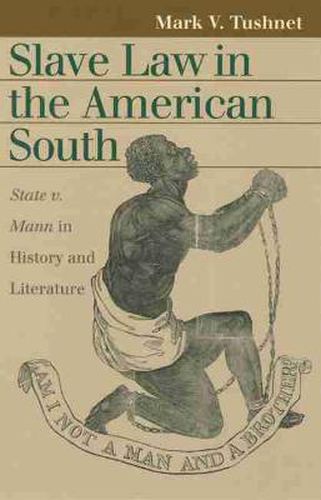Readings Newsletter
Become a Readings Member to make your shopping experience even easier.
Sign in or sign up for free!
You’re not far away from qualifying for FREE standard shipping within Australia
You’ve qualified for FREE standard shipping within Australia
The cart is loading…






Slavery in the American South could not have existed without the authority of law defining slaves as the property of their masters. But the fact that slaves were also human beings placed limits on this harsh reality. When the rigor of the law and the complex bonds of sentiment linking master and slave came into conflict, masters looked to the courts. In one such case, State v. Mann, North Carolina Supreme Court justice Thomas Ruffin ruled that masters could not be prosecuted for assaulting their slaves. In articulating the legal basis for his decision, Justice Ruffin also revealed his own view of the logic of slavery, in which he sanctioned the owner’s rights even as he expressed his own horror at the mistreatment of the slave.
Legal historian Mark Tushnet, one of the foremost living authorities on antebellum slave law, now shows how studying such a simple case can illuminate an entire society. For those who detested slavery, the case represented all that was intolerable about that institution; for those who defended it, it raised vexing and persistent issues that could not be wished away.
As further testament to the importance of State v. Mann, Harriet Beecher Stowe even made it central to her second antislavery novel, Dred. Tushnet discusses the opinion’s place in the novel–in which she quoted liberally from Ruffin’s decision–and evaluates other historians’ interpretations of both the opinion and Stowe’s provocative novel.
Tushnet provides a finely detailed analysis of Ruffin’s opinion, portraying the judge as a man compelled by law to uphold the slave-owner’s right while moved as a Christian by the slave’s maltreatment and ever hopeful that communal morality and a deep-seated sense of honor would moderate the excesses of slave owners. As Tushnet shows, however, slave law was a means for maintaining the ideological hegemony of the Southern master class.
Slave Law in the American South paints a broad picture of a landmark case, tying together legal, historical, social, political, and even literary strands to show how the law itself was implicated in the persistence of slavery. It sheds new light on slavery and Southern history, as it probes the conscience of a troubled jurist incapable of fully transcending his times.
$9.00 standard shipping within Australia
FREE standard shipping within Australia for orders over $100.00
Express & International shipping calculated at checkout
Slavery in the American South could not have existed without the authority of law defining slaves as the property of their masters. But the fact that slaves were also human beings placed limits on this harsh reality. When the rigor of the law and the complex bonds of sentiment linking master and slave came into conflict, masters looked to the courts. In one such case, State v. Mann, North Carolina Supreme Court justice Thomas Ruffin ruled that masters could not be prosecuted for assaulting their slaves. In articulating the legal basis for his decision, Justice Ruffin also revealed his own view of the logic of slavery, in which he sanctioned the owner’s rights even as he expressed his own horror at the mistreatment of the slave.
Legal historian Mark Tushnet, one of the foremost living authorities on antebellum slave law, now shows how studying such a simple case can illuminate an entire society. For those who detested slavery, the case represented all that was intolerable about that institution; for those who defended it, it raised vexing and persistent issues that could not be wished away.
As further testament to the importance of State v. Mann, Harriet Beecher Stowe even made it central to her second antislavery novel, Dred. Tushnet discusses the opinion’s place in the novel–in which she quoted liberally from Ruffin’s decision–and evaluates other historians’ interpretations of both the opinion and Stowe’s provocative novel.
Tushnet provides a finely detailed analysis of Ruffin’s opinion, portraying the judge as a man compelled by law to uphold the slave-owner’s right while moved as a Christian by the slave’s maltreatment and ever hopeful that communal morality and a deep-seated sense of honor would moderate the excesses of slave owners. As Tushnet shows, however, slave law was a means for maintaining the ideological hegemony of the Southern master class.
Slave Law in the American South paints a broad picture of a landmark case, tying together legal, historical, social, political, and even literary strands to show how the law itself was implicated in the persistence of slavery. It sheds new light on slavery and Southern history, as it probes the conscience of a troubled jurist incapable of fully transcending his times.